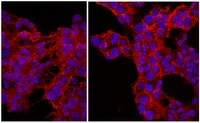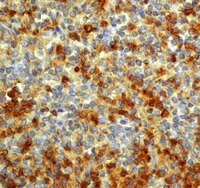AB5320C3 Sigma-AldrichAnti-NG2 Chondroitin Sulfate Proteoglycan, Cy3 Conjugate Antibody
Anti-NG2 Chondroitin Sulfate Proteoglycan, Cy3 Conjugate Antibody is an antibody against NG2 Chondroitin Sulfate Proteoglycan for use in ICC & IHC.
More>> Anti-NG2 Chondroitin Sulfate Proteoglycan, Cy3 Conjugate Antibody is an antibody against NG2 Chondroitin Sulfate Proteoglycan for use in ICC & IHC. Less<<Recommended Products
Overview
| Replacement Information |
|---|
Key Specifications Table
| Species Reactivity | Key Applications | Host | Format | Antibody Type |
|---|---|---|---|---|
| R, M, H, Mk | ICC, IHC | Rb | Cy3 | Polyclonal Antibody |
| References |
|---|
| Product Information | |
|---|---|
| Format | Cy3 |
| Control |
|
| Presentation | Purified rabbit polyclonal conjugated to Cy3 in PBS with 0.1% sodium azide and 15 mg/mL BSA. |
| Quality Level | MQ100 |
| Physicochemical Information |
|---|
| Dimensions |
|---|
| Materials Information |
|---|
| Toxicological Information |
|---|
| Safety Information according to GHS |
|---|
| Safety Information |
|---|
| Storage and Shipping Information | |
|---|---|
| Storage Conditions | Maintain refrigerated at 2-8 °C protected from light in undiluted aliquots for up to 6 months from date of receipt. |
| Packaging Information | |
|---|---|
| Material Size | 100 µL |
| Transport Information |
|---|
| Supplemental Information |
|---|
| Specifications |
|---|
| Global Trade Item Number | |
|---|---|
| Catalog Number | GTIN |
| AB5320C3 | 04053252688980 |
Documentation
Anti-NG2 Chondroitin Sulfate Proteoglycan, Cy3 Conjugate Antibody SDS
| Title |
|---|









